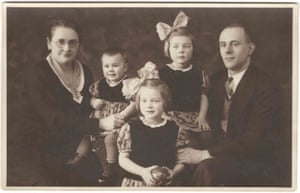An entire German family is murdered in a gang robbery. The head of the family, severely injured, survives by playing dead. He seeks forgiveness for the robbers, and starts a new family, living in the same house where it happened, by dire necessity. He petitions the state for the release of those who had not touched the two guns used. ¶ He and the family are pestered by reporters, not wanting to revisit those events. He writes a manuscript and eventually publishes the account as a little book in 1960. A grandaughter reads it and shares this account of deep, radical forgiveness. (Clear writing and reporting by the grandaughter.)

My grandfather’s whole family were murdered – but he found a way to forgive the killers
After 12 of his relatives were killed in a single night, where was his anger and pain? And what does his refusal to permit himself these feelings mean for me?
I don’t know when I first heard my grandfather’s story. But I do remember the little green book with the white cross on it. The book was kept in a black steel cabinet in our living room, one that was usually locked, its contents mysterious. There must be important things in there, I thought, that were not for me to see.
My paternal grandparents were part of my childhood; my sister and I called them Oma and Opa and paid them regular visits, but we knew very little about our mother’s parents. [Continued here.] repaired link
